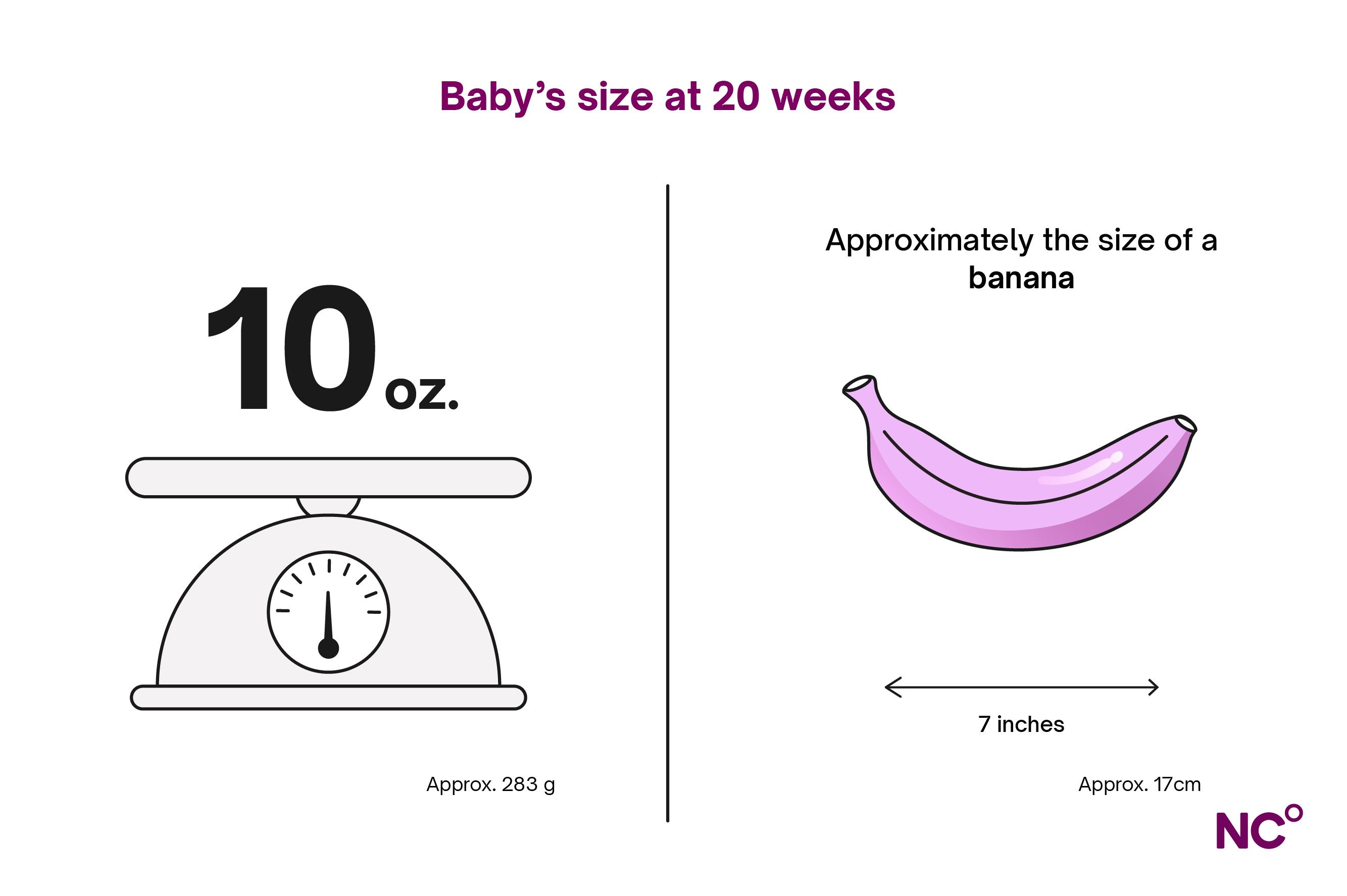20 Weeks pregnant: Symptoms, baby development and tips
Follows NC° Editorial Policy
At Natural Cycles, our mission is to empower you with the knowledge you need to take charge of your health. At Cycle Matters, we create fact-checked, expert-written content that tackles these topics in a compassionate and accessible way. Read more...
Key takeaways:
- Nosebleeds, digestive issues, and restless sleep are all common in week 20 of your pregnancy
- Baby hiccups might feel weird in your stomach, but they are completely normal as your baby is developing its swallowing, lung, and diaphragm muscles
- An ultrasound scan around week 20 is important for checking on the development and growth of your baby
Welcome to week 20 and the halfway point of your pregnancy (give or take)! You have done tremendous work thus far and only have around 20 more weeks to go. In this week’s guide, we will talk about nosebleeds and digestive issues – two changes you might experience in your body in your second trimester. We will also talk about your baby’s development in week 20 and what to expect in your upcoming ultrasound. Finally, we will go over a couple of pregnancy symptoms that might be affecting you and offer some tips for managing your mental and physical health this week.
Your body at week 20
Nosebleeds
As the demands on your circulatory system increase during pregnancy, your body's working overtime to produce and circulate an especially large volume of blood. By the end of pregnancy, your blood volume will increase an average of 50% from pre pregnancy levels [1]. One unexpected side effect is an increased frequency of nosebleeds. Nosebleeds, or epistaxis in medical-speak, happen when the tiny blood vessels close to the surface of your inner nose skin injure or break, causing them to bleed. Blowing your nose, breathing dry air, and increased circulation during pregnancy can all make these blood vessels especially sensitive and prone to rupture [2].
In most cases, nosebleeds are minor and not a cause for concern. If you experience a nosebleed, it is recommended to sit upright or lean slightly forward to prevent the blood from flowing down your throat. Gently pinch the soft part of your nose, just above your nostrils, for 10-15 minutes or until bleeding stops. You can try and prevent nosebleeds by avoiding blowing your nose harshly and using a humidifier to increase the moisture in the air in your space.
If the nosebleed is substantial, comes following a head injury, or continues after 10-15 minutes of pinching your nostrils, contact your care team.
Digestive issues
At this stage of your pregnancy, you are probably very familiar with the hormonal fluctuations that come with pregnancy and their related sideeffects like nausea, mood swings, and increased hair and nail growth. In particular, increases in progesterone and relaxin both contribute to muscle relaxation and a slowing down of your digestive tract that can continue through your second and third trimesters. This affects many different organs, including your stomach, small and large intestines, and gallbladder.
Some common second trimester digestive issues include [3]:
- Indigestion and heartburn: both are considered part of gastroesophageal reflux disease, or GERD. During pregnancy, these tend to be caused by a relaxation of the muscle that prevents stomach contents from backing up into your esophagus. They can also cause bloating and nausea. If you already suffered from GERD before becoming pregnant, it's possible that these symptoms can worsen during pregnancy.
- Gallstones: your gallbladder is responsible for storing bile before it travels to the small intestine. When digestion is slowed during pregnancy there is an increased risk of developing gallstones, which are caused by non-dissolving substances in bile becoming too concentrated. While some gallstones can pass without signs or symptoms, they can also become stuck, causing sudden and severe pain in your upper right or center abdomen, pain between your shoulder blades or in your shoulder, and nausea or vomiting. If you experience any of these symptoms, or suspect you are suffering from gallstones, contact your healthcare team immediately.
- Diarrhea: though commonly associated with viruses, bacterial infections, and certain medications, pregnancy can also cause loose or watery stools. You might also experience cramps, bloating or nausea. Iron supplements, which are commonly advised for women during pregnancy, can also cause diarrhea for some women. In general, if diarrhea lasts more than 48 hours, you notice blood in your stools, or you have fever, contact your physician or OB GYN. Be sure to keep drinking fluids, as diarrhea can cause dehydration.
- Constipation: seemingly the opposite of diarrhea, pregnancy can also cause infrequent or hard-to-pass bowel movements known as constipation. Strain and pressure caused by passing difficult stools can also cause hemorrhoids, which is a swelling of the veins in and around the anus. If you are taking iron supplements as advised by a nurse or doctor during your pregnancy, these can also contribute to constipation.
The most common treatments for managing digestive issues during pregnancy are maintaining a healthy diet, staying hydrated, and regular exercise. It is also recommended to stick with smaller, frequent meals and reduce foods that are fatty, greasy, and spicy if you are suffering from indigestion or heartburn.
Be sure to communicate with your healthcare provider about any gastrointestinal or digestive issues you are experiencing during your pregnancy.
Your baby’s development at 20 weeks
Your growing baby is around the size of a banana this week, weighing between 9 and 10.6 ounces (260 to 300 grams) and measuring 6.5 to 7.75 inches long (16.4-19.7 centimeters) [4].

Your baby is likely learning how to suck its thumb and also swallowing this week. They might also start to get the hiccups, which can feel like sudden, jerky movements in your belly, or like a gentle rhythmic tapping. While doctors aren’t quite sure why babies so commonly get hiccups in the womb, it may be linked to lung and diaphragm development, the development of swallowing, and the circulation of amniotic fluid in the uterus [5].
Week 20 scan
You will likely have an ultrasound scan between weeks 18 and 22. Your baby has developed a great deal since the first trimester scan, and there is a lot more you will be able to see. This scan is often called an anatomy or anomaly scan, because the main goal is to check for potential signs of medical conditions that might affect their health and development [6].
Your baby’s major organs, limbs, skull, spine and neck will be examined in this ultrasound, and detailed measurements will be taken to check on their physical development [7]. You will also be able to see your baby’s face, hands, and feet in much greater detail. The midwife or technician will also check the placenta, cervix, and the amount of amniotic fluid in the uterus. Since your baby’s genital organs are also developed, you will be able to find out the sex of your baby (or babies) if you wish, and if you haven’t already found out through other examinations or blood tests.
This scan is very thorough and usually takes 30 to 45 minutes, but can take longer depending on whether your baby is cooperating and giving the midwife or technician the right view!
Pregnancy symptoms in week 20
Restless sleep
There are a number of physical and mental symptoms that can affect your sleep in week 20. Your growing belly, leg cramps, and physical fatigue can all make getting comfortable difficult. Stress, anxiety, and strange dreams can also disrupt sleep or make it more difficult to get to sleep.
Try using extra pillows or a pregnancy body pillow to provide extra support when lying down. A pillow between the knees can also help relieve discomfort in the hips and pelvis. As your belly grows, you might find it most comfortable to sleep on your side, which can also help with circulation. Exercise, meditation, journaling, and avoiding caffeine in the evening can also help ensure the best possible night’s sleep.
If you are concerned about insomnia, or if you suspect sleep disruption might be linked to another mental health issue like depression or anxiety, speak with your doctor or midwife. There are treatments available that can help you.
Growing appetite
Have you been feeling particularly hungry? With nausea and food aversions hopefully behind you, it’s normal to experience a growing appetite this week. While no extra calories are required in the first trimester, scientific studies have shown that your body needs an additional average of around 340 calories per day in the second trimester [8].
However, keep in mind that your growing baby and expanding uterus can crowd your stomach and intestines, prompting you to eat smaller portions. Eating especially large meals, particularly in the evening or if you are already suffering from heartburn or indigestion, can also worsen digestive symptoms and disrupt your sleep. Try opting for slightly smaller meals more frequently throughout the day.
Tips in week 20
- Prioritize pleasure: for many women, sex drive can increase in the second trimester. If you are suddenly feeling the urge, talk to your partner about how you’re feeling. Unless not recommended during your pregnancy, sex can be a wonderful way to build strong connections with your partner during this special time. Remember, going solo is also OK, and can be a great mood booster. Check out our guide on having sex during pregnancy with information about both safety as well as guidance and tips.
- Planning for childcare: with your baby’s arrival likely many months away, it might seem like an odd time to start thinking about childcare, or daycare. However, depending on where you live and your family leave situation, it might be necessary to start planning how you will manage care for your new family member. In some places, waitlists for infant daycare can be months (or years) long. Starting your search now can save time and stress later.
- Consider journaling: feeling overwhelmed by the tasks you are managing or bogged down by brain fog? Journaling can be a great way to get organized mentally and physically. It doesn’t have to be neat or coherent, sometimes even jotting down a list of thoughts or projects on your plate can be a great tool for relieving stress and anxiety, helping you get through your day or even sleep a little easier.
Stay informed with Natural Cycles
Did you know you can use Natural Cycles throughout your pregnancy to stay informed on your baby’s development and the changes going on in your body? NC° Follow Pregnancy provides weekly guides that follow your baby’s growth and provide helpful tips on managing physical and mental pregnancy symptoms. You can also use the app’s symptom tracker to keep track of your individual pregnancy symptoms, which can be helpful in prenatal appointments. It’s more than birth control – why not try Natural Cycles today?
Did you enjoy reading this article?
